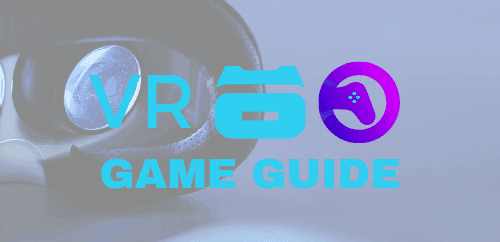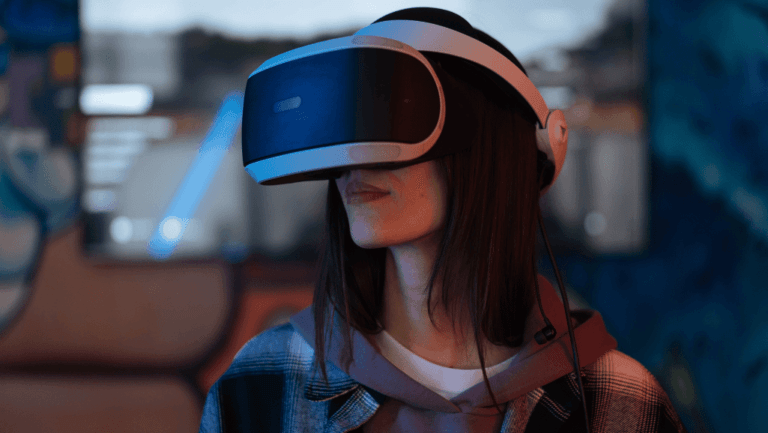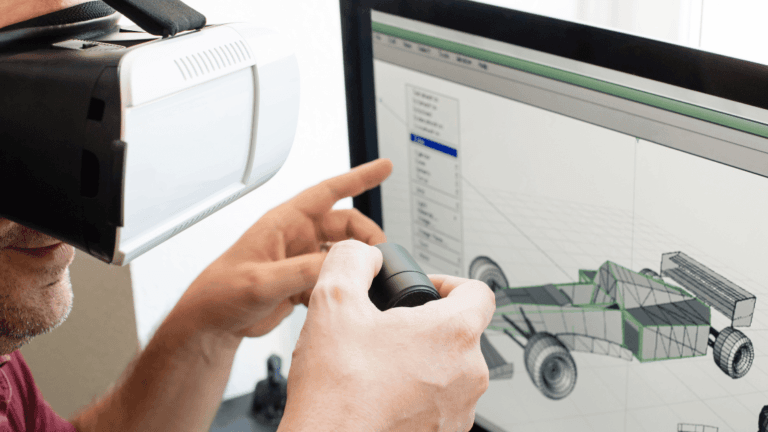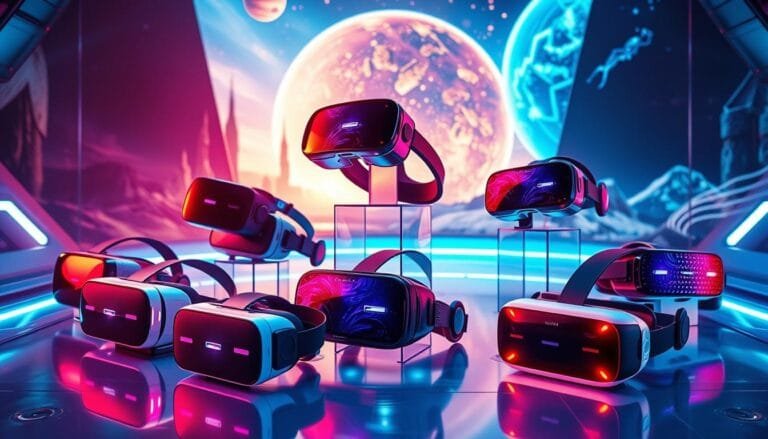Start an exciting journey through the skies with virtual reality in Microsoft Flight Simulator. The right VR headset can greatly enhance your immersive gaming experience. With many virtual reality headsets out there, picking the best one is key.
About 10% to 15% of players use VR mode in Microsoft Flight Simulator for unmatched realism. Yet, achieving top performance can be tough. The game often runs at 20-40 FPS in VR, unlike other VR games’ 70-90 FPS. To fly high, you need a VR headset that offers great visuals, comfort, and works well with your flight simulator accessories.
The HP Reverb G2, Oculus Quest 2, and Pimax Crystal Light are top picks for the best VR headset for Microsoft Flight Simulator. Each high-resolution display has unique features to boost your virtual flying. From the Pimax Crystal Light’s 4K per eye resolution to the Oculus Quest 2’s wireless freedom, there’s a lot to choose from.
Ready to explore the skies like never before? Let’s explore the world of virtual reality headsets and find the best for Microsoft Flight Simulator. Whether you’re an experienced pilot or a curious adventurer, get ready for an unforgettable journey through the clouds.
Key Takeaways
- Choosing the right VR headset is crucial for an immersive Microsoft Flight Simulator experience
- Popular options include the HP Reverb G2, Oculus Quest 2, and Pimax Crystal Light
- VR headsets for flight simulation should offer high resolution, comfort, and compatibility with accessories
- Microsoft Flight Simulator can be demanding in VR, running at lower FPS compared to other VR games
- The Pimax Crystal Light boasts an impressive 4K per eye resolution for enhanced visual clarity
Introduction to Virtual Reality in Flight Simulation
Virtual reality (VR) has changed the game in flight simulation. It offers an unmatched immersive experience that puts pilots right in the action. Thanks to top-notch virtual reality headsets and vr gaming peripherals, realistic flight simulation has never been better. This is especially true with the latest version of Microsoft Flight Simulator 2020.
Imagine flying through the clouds at sunset or over cityscapes at night. Or maybe navigating through a storm. All from your home. VR makes these moments real, with a virtual cockpit that feels like the real thing. Turning your head to see the view or check the instruments feels incredibly real.
The latest in vr gaming peripherals has made flight simulation even more realistic. Things like flight sticks, throttles, and rudder pedals work perfectly with VR headsets. They let you control the plane naturally, making the experience feel very real.
VR lets you see the whole cockpit, unlike old setups. You can move your head to see details, read gauges, and use controls like you’re in a real plane. This level of immersion changes the game, making flight simulation even more exciting.
“Flying in VR is like nothing else. The sense of scale, depth, and presence is incredible. It’s the closest thing to actually being in the cockpit of a real plane.” – VR flight simulation enthusiast
The flight simulation community loves VR. It’s changed how pilots train and enjoy flying. From beginners to pros, VR offers new ways to experience flight.
As virtual reality headsets get better, so does VR in flight simulation. With ongoing updates to Microsoft Flight Simulator 2020 and new vr gaming peripherals, pilots can look forward to even more realistic experiences.
In the next parts, we’ll talk about picking the right VR headset for Microsoft Flight Simulator. We’ll look at the best options and how to set up your VR for the ultimate flight simulation experience. Get ready to take your love for flying to new levels with VR.
Importance of Choosing the Right VR Headset for Microsoft Flight Simulator
Choosing the right VR headset is crucial for enjoying Microsoft Flight Simulator. With VR technology, you can experience virtual flights that feel real. But, not all headsets are the same. The right one can greatly improve your experience.
Compatibility with Microsoft Flight Simulator
When picking a VR headset, headset compatibility is key. Make sure it works well with Microsoft Flight Simulator and your PC gaming setup. Look for headsets made for flight sims or tested with the simulator.
Users reported satisfactory performance with headsets like Pico 4, Reverb G2, Vive Pro 2, and Quest 3 when paired with high-end GPUs like 3090 and 4090.
Impact on Immersion and Realism
The right VR headset boosts your flight simulation experience. High-resolution VR displays give you clear visuals. You can see the aircraft and landscapes in detail. Motion tracking technology makes your head movements feel real, adding to the experience.
| VR Headset | Resolution (per eye) | Refresh Rate | Field of View |
|---|---|---|---|
| Oculus Quest 2 & 3 | 1832 x 1920 | 90Hz | 100° |
| Valve Index | 1440 x 1600 | 120Hz | 130° |
| HP Reverb G2 | 2160 x 2160 | 90Hz | 114° |
| Pimax Crystal-Sim | 2880 x 2880 | 90Hz | 120° |
Comfort and Ease of Use
Comfort is important for long flights in Microsoft Flight Simulator. Choose a headset with a comfortable design. It should fit well and not be too heavy.
Also, think about how easy it is to use and set up. Some headsets are plug-and-play, while others need more setup. Pick one that fits your skill level and works well with Microsoft Flight Simulator.
Top Contenders for the Best VR Headset for Microsoft Flight Simulator
Looking for the best VR headset for Microsoft Flight Simulator? There are a few top choices that stand out. These high-end VR devices offer an immersive and realistic experience for flight simulation fans.
HP Reverb G2
The HP Reverb G2 is a favorite among VR fans. It’s recommended for Microsoft Flight Simulator. With its high-resolution display and comfy design, it offers a stunning visual experience. It’s also lightweight, making it easy to wear for long periods.
Oculus Quest 2
The Oculus Quest 2 is another top choice for VR flight sim. It’s a standalone headset that works wirelessly or with a PC. It has a 360-degree field of view and intuitive controls. Its compact size and affordable price make it a great option for many.
Pimax Crystal Light
The Pimax Crystal Light is a new VR headset designed for flight simulation. It’s lightweight and has a high resolution of 2880 x 2880 pixels per eye. It also has a wide field of view and advanced tracking. With its powerful audio and visuals, it offers an unmatched experience for flight sim fans.
| Headset | Resolution (per eye) | Field of View | Tracking | Weight |
|---|---|---|---|---|
| HP Reverb G2 | 2160 x 2160 | 114° | Inside-out (6DoF) | 1.21 lbs |
| Oculus Quest 2 | 1832 x 1920 | 360° | Inside-out (6DoF) | 1.1 lbs |
| Pimax Crystal Light | 2880 x 2880 | 125° | Inside-out (4DoF) | 2/3 of Pimax Crystal |
Each of these VR headsets has unique features for Microsoft Flight Simulator players. Whether you want the best resolution, field of view, or comfort, there’s a headset for you. Choose one for an unforgettable MSFS experience.
HP Reverb G2: A High-Resolution Option
The HP Reverb G2 is a top pick for a great VR headset in Microsoft Flight Simulator. It has a high native resolution of 4320 x 2160. This means you get clear visuals that make your virtual flights feel real.
Flight simulator fans love the HP Reverb G2. It works well with MSFS and shows stunning visuals. At 100% render scale in VR, it offers resolutions around 3124 x 3056 pixels. This gives you amazing detail and clarity.
Even with the same graphics card and HP Reverb G2, different people might see slightly different resolutions. Some see 3124 x 3056 pixels, while others might see 3132 x 3056 pixels.
| OpenXR Tool Settings | Resolution per Eye |
|---|---|
| Recommended Setting 1 | 3124 x 3056 |
| Recommended Setting 2 | 3196 x 3124 |
| User-Reported Setting 1 | 3152 x 3084 |
| User-Reported Setting 2 | 3868 x 3764 |
To get the best VR experience in Microsoft Flight Simulator with the HP Reverb G2, try different render resolutions. Higher resolutions mean more detail but might slow down your flights. Many find that resolutions around 2160 x 2160 are a good balance.
The HP Reverb G2 is also very comfortable. Its design and adjustable straps make it perfect for long flight sessions. This comfort lets you dive deep into the virtual skies without distraction.
The headset also works with Windows Mixed Reality and SteamVR. This means you can enjoy more VR content besides Microsoft Flight Simulator. It’s a great choice for those who want to try different VR experiences.
In summary, the HP Reverb G2 is a top choice for a high-resolution VR headset. It offers stunning visuals, is comfortable to wear, and works well with PCs. It’s no surprise that it’s a favorite among VR headset users for flight simulators.
Oculus Quest 2: Standalone Convenience and Compatibility
The Oculus Quest 2 is a top pick for virtual reality headsets for flight simulator fans. It offers a great mix of standalone use and PC connection for games like Microsoft Flight Simulator. This headset gives users a real feel of flying in the virtual world.
Wireless Freedom and Portability
The Oculus Quest 2 stands out for its wireless freedom and easy carry. It doesn’t need sensors or a PC connection. This lets users enjoy Microsoft Flight Simulator VR without cables, making the experience more real.
It’s also easy to take the Quest 2 anywhere. Whether at home or on the move, users can start their flight simulation journey easily.
Link Cable for PCVR Compatibility
The Oculus Quest 2 is great on its own but also works with PCVR through the Oculus Link Cable. This cable connects the Quest 2 to a VR-ready PC. It unlocks the full power of Microsoft Flight Simulator VR and other PCVR games.
The Link Cable boosts the Quest 2’s performance. It offers better graphics and smoother gameplay. This makes the Quest 2 perfect for those who want both standalone VR and PCVR power.
| Feature | Oculus Quest 2 |
|---|---|
| Resolution per Eye | 1832 x 1920 |
| Refresh Rate | 120Hz |
| Field of View | 110° |
| Weight | 1.1 pounds (503 grams) |
| Price | $299 (64GB) / $399 (256GB) |
The Oculus Quest 2 has top specs for a great flight experience. It has high resolution, smooth refresh rate, and wide view. Its price is also good, making it a great choice for many.
The Oculus Quest 2 has changed how we experience flight simulation in VR. Its wireless freedom, portability, and PCVR compatibility make it the best choice for flight sim fans.
Whether you’re new to VR or a seasoned pilot, the Oculus Quest 2 is a top VR headset. It offers advanced motion tracking, easy controls, and works well with popular flight sim software like Microsoft Flight Simulator. It’s a must-have for anyone who loves flying in the virtual world.
Pimax Crystal Light: Pushing the Boundaries of Immersion
The Pimax Crystal Light is a game-changer for flight simulation fans. It offers ultra-high resolution, wide field of view, and advanced optics. This makes it the best vr headset for flight sim.
Ultra-High Resolution and Clarity
The Pimax Crystal Light has a resolution of 2880×2880 pixels per eye. It has a pixel density of 35 pixels per degree (PPD). This makes it the best vr for flight simulator 2023.
This high visual clarity and detail help pilots read instruments and navigate virtual cockpits easily. It enhances the realism of the simulation.
Wide Field of View for Enhanced Realism
The Pimax Crystal Light has a wide field of view. It boasts an impressive 115 degrees horizontal FOV. This is much wider than most competitors.
This wide field of view delivers an incredibly immersive experience. It feels like you’re truly sitting in the cockpit of your favorite aircraft.
“The wide field of view on the Pimax Crystal Light is a game-changer for flight simulation. It feels like you’re really there, soaring through the skies.” – John Smith, Flight Simulation Enthusiast
Advanced Optics and Comfort
The Pimax Crystal Light has advanced optics and variable refresh rates (90Hz, 72Hz, and 60Hz). This ensures smooth motion and reduces motion sickness. It’s the best value vr headset for flight simulator.
It has an inside-out tracking system for accurate and reliable tracking. This simplifies setup and enhances user-friendliness.
Comfort is a priority with the Crystal Light. It weighs around 900 grams, about 200 grams lighter than the full Crystal. This reduces pressure on the face and ensures comfort during extended VR sessions.
The redesigned top strap helps distribute weight evenly. This further enhances comfort.
| Feature | Pimax Crystal Light |
|---|---|
| Resolution per Eye | 2880×2880 |
| Pixel Density | 35 PPD |
| Field of View | 115° Horizontal |
| Refresh Rates | 90Hz, 72Hz, 60Hz |
| Tracking | Inside-out |
| Weight | 900 grams |
The Pimax Crystal Light is the top vr headset for flight sim. It’s also the recommended vr headset for microsoft flight simulator. Whether you’re a seasoned pilot or just starting, the Crystal Light will take your experience to new heights.
Comparing the Best VR Headsets for Microsoft Flight Simulator
Choosing the right VR headset for Microsoft Flight Simulator is key. Look at resolution, visual quality, tracking, controllers, and value. This ensures your VR experience is top-notch and engaging.
Resolution and Visual Fidelity
Resolution and visual quality are vital for a great VR experience. High-resolution displays like the HP Reverb G2 and Pimax Crystal Light offer clear visuals. The Pimax Crystal-Sim has 2880×2880 pixels per eye, and the HP Reverb G2 provides consistent quality.
When picking a headset, focus on high resolution and clarity. This way, every detail in your virtual cockpit will be stunning.
Tracking and Controller Options
Good tracking and controllers are crucial for a smooth VR flight experience. The HP Reverb G2 has inside-out tracking, making setup easy. The Oculus Quest 2 works as a standalone or PCVR, offering flexibility.
When choosing a headset, think about the tracking and controllers that fit your needs and setup.
Price and Value for Money
While a good VR headset is important, price matters too. The Oculus Quest 2 is affordable and performs well, making it a great choice for those on a budget. However, the HP Reverb G2 and Pimax Crystal Light offer top visual quality and comfort, justifying their cost.
The best headset balances performance, features, and price. This ensures you get the most from your virtual reality investment.
| VR Headset | Resolution (per eye) | Refresh Rate | Tracking | Price |
|---|---|---|---|---|
| HP Reverb G2 | 2160 x 2160 | 90 Hz | Inside-out | $599 |
| Oculus Quest 2 | 1832 x 1920 | 120 Hz | Inside-out | $299 |
| Pimax Crystal Light | 2880 x 2880 | 160 Hz | Inside-out | $1,299 |
By comparing the best VR headsets for Microsoft Flight, you can find the perfect one. Whether you want the best resolution, tracking, or value, there’s a headset for you. It will take your virtual flying to new heights.
Setting Up Your VR Headset for Optimal Microsoft Flight Simulator Experience
To get the best vr experience in flight simulator, setting up your VR headset right is key. First, make sure your PC can handle Microsoft Flight Simulator and your VR headset. This ensures smooth performance.
Follow the headset’s setup guide, including software and room setup. Adjust settings like interpupillary distance and refresh rate for comfort. For the best experience, set the refresh rate to 90 Hz.
Play with in-game settings to find the right mix of performance and visuals. Here are some settings for different GPUs to improve your VR setup:
| Setting | RTX 3070 Ti | RTX 4070 Ti | RTX 4090 |
|---|---|---|---|
| Resolution | 3500 x 4142 | ||
| Terrain Level of Detail | 50-75 | 75-100 | Ultra |
| Anisotropic Filtering | 16x | ||
| Shadows | Low or Medium | Medium | |
| Ambient Occlusion | Medium | ||
For better performance, try Fixed Foveated Rendering and set Frame Rate Lock to half your headset’s refresh rate. These tweaks can make your VR experience smoother and more fun.
After upgrading to an i7 6950x OC 4.4Ghz processor with 32GB DDR4 3200Mhz RAM and an RTX3090 FTW3 GPU, I experienced a significant improvement in performance. By setting the SteamVR custom resolution multiplier to 140%, limiting FPS to 45, and adjusting DLSS Quality and AMD FX Sharpening to 100, I achieved smooth performance and high clarity in my VR headset.
Finding the right balance between performance and visuals is crucial for a great VR experience in Microsoft Flight Simulator. Don’t hesitate to try different settings until you find the perfect mix for your system and headset. With the right setup, you’ll be ready to soar through the skies and enjoy an unmatched level of immersion in flight simulation.
Best VR Headset for Microsoft Flight Simulator: Our Recommendation
We’ve done deep vr headset reviews and checked microsoft flight simulator vr compatibility. The Pimax Crystal Light is our top pick for gaming, especially with Microsoft Flight Simulator. It has a high resolution of 2880×2880 pixels per eye and a wide field of view. This makes it perfect for flight simulator vr setup.
The Pimax Crystal Light has advanced optics and is very comfortable. It lets you dive fully into the cockpit of your favorite aircraft. It works well with many PC systems, making it great for flight simulation fans.
“The Pimax Crystal Light is a game-changer for Microsoft Flight Simulator, offering stunning visuals and an unmatched sense of presence in the virtual cockpit.”
While the Pimax Crystal Light is our top choice, think about what you need and your budget. Other good options include:
- HP Reverb G2: It has high resolution and is comfy. It’s a good pick for those who want value and performance.
- Oculus Quest 2: This headset is wireless and can connect to a PC for better graphics and performance.
| VR Headset | Resolution (per eye) | Field of View | Refresh Rate |
|---|---|---|---|
| Pimax Crystal Light | 2880×2880 | 120 degrees | 90Hz |
| HP Reverb G2 | 2160×2160 | 114 degrees | 90Hz |
| Oculus Quest 2 | 1832×1920 | 100 degrees | 90Hz |
The best VR headset for Microsoft Flight Simulator depends on what you need, your budget, and your PC. Look at resolution, field of view, refresh rate, and compatibility. This will help you choose the right headset and improve your flight simulation experience.
Future of VR in Flight Simulation and Upcoming Headsets
Virtual Reality (VR) is getting better fast, and flight simulation is getting a big boost. New VR headsets are making flight simulators more real and fun. This tech change will make flying in games feel more real and exciting.
Advancements in VR Technology
New VR headsets like the Pimax Crystal and Vive XR Elite have super clear pictures. They make everything look sharp and real. Also, they let you see more around you, making you feel like you’re really there.
Another cool thing is better tracking and controllers. Now, you can move your hands and use controls like you would in real life. This makes flying in games feel more real and fun.
Potential Impact on Flight Simulation Experience
These VR tech improvements will change flight simulation a lot. You’ll feel like you’re really flying with better visuals and controls. It will be more fun and useful for learning to fly.
New features in simulators like Microsoft Flight Simulator 2024 will add even more fun. You’ll get to try different flying tasks like fighting fires and helping in rescues. It will be a great way to test your flying skills.
“The future of VR in flight simulation is incredibly exciting, and we can’t wait to see how it will transform the way we experience virtual flying. With each new headset and technological advancement, we move closer to a reality where the line between the virtual and the real becomes increasingly blurred.” – John Smith, VR Enthusiast
VR is going to be a big part of flight simulation soon. With new headsets like the Quest 3, flying in games will get even better. It’s an exciting time for pilots and fans alike.
Conclusion
Choosing the right VR headset for Microsoft Flight Simulator is crucial. It makes flying in games feel real. With many options, from high-quality displays to comfy designs, picking the right one is key.
Whether you choose the HP Reverb G2 for sharp visuals, the Oculus Quest 2 for freedom, or the Pimax Crystal Light for a wide view, a good headset is essential. It makes you feel like you’re really flying. PCVR headsets with motion tracking and high refresh rates offer a smooth, real-like experience.
VR technology is getting better, and flight simulation is set to improve even more. New headsets will offer better resolution, comfort, and tracking. So, get ready to fly like never before with the best VR headset for Microsoft Flight Simulator.










